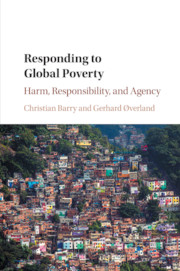Crossref Citations
This Book has been
cited by the following publications. This list is generated based on data provided by Crossref.
Woollard, Fiona
2018.
Should we talk about the ‘benefits’ of breastfeeding? The significance of the default in representations of infant feeding.
Journal of Medical Ethics,
Vol. 44,
Issue. 11,
p.
756.
Barry, Christian
2019.
Harm, responsibility, and enforceability.
Ethics & Global Politics,
Vol. 12,
Issue. 1,
p.
76.
Ratner, Steven
2019.
International law and political philosophy: Uncovering new linkages.
Philosophy Compass,
Vol. 14,
Issue. 2,
Lawford-Smith, Holly
2019.
Are ‘the affluent’ responsible for global poverty?.
Ethics & Global Politics,
Vol. 12,
Issue. 1,
p.
61.
Nili, Shmuel
2019.
Global poverty, global sacrifices, and natural resource reforms.
International Theory,
Vol. 11,
Issue. 1,
p.
48.
Nefsky, Julia
2019.
Collective harm and the inefficacy problem.
Philosophy Compass,
Vol. 14,
Issue. 4,
Woollard, Fiona
2019.
Barry and Øverland on doing, allowing, and enabling harm.
Ethics & Global Politics,
Vol. 12,
Issue. 1,
p.
43.
Polkamp, Anne G.
2019.
Individual contributions to collective harm: how important is causation?.
Ethics & Global Politics,
Vol. 12,
Issue. 1,
p.
52.
Brando, Nicolás
and
Schweiger, Gottfried
2019.
Philosophy and Child Poverty.
Vol. 1,
Issue. ,
p.
1.
Valentini, Laura
2019.
Arguing for assistance-based responsibilities: are intuitions enough?.
Ethics & Global Politics,
Vol. 12,
Issue. 1,
p.
24.
Koksvik, Ole
and
Øverland, Gerhard
2019.
Profiting from poverty.
Canadian Journal of Philosophy,
Vol. 49,
Issue. 3,
p.
341.
Haydar, Bashshar
and
Øverland, Gerhard
2019.
Hypocrisy, Poverty Alleviation, and Two Types of Emergencies.
The Journal of Ethics,
Vol. 23,
Issue. 1,
p.
3.
Burri, Susanne
2020.
Why Moral Theorizing Needs Real Cases: The Redirection of V‐Weapons during the Second World War.
Journal of Political Philosophy,
Vol. 28,
Issue. 2,
p.
247.
Gilabert, Pablo
2020.
Defending human dignity and human rights.
Journal of Global Ethics,
Vol. 16,
Issue. 3,
p.
326.
Armstrong, Chris
2020.
Decarbonisation and World Poverty: A Just Transition for Fossil Fuel Exporting Countries?.
Political Studies,
Vol. 68,
Issue. 3,
p.
671.
MacAskill, William
and
Pummer, Theron
2020.
The International Encyclopedia of Ethics.
p.
1.
Umbers, Lachlan Montgomery
and
Moss, Jeremy
2020.
The Climate Duties of Sub-National Political Communities.
Political Studies,
Vol. 68,
Issue. 1,
p.
20.
Erskine, Toni
2021.
Still avoiding Armageddon: neglected antecedents and the future promise of Australian normative IR theory.
Australian Journal of International Affairs,
Vol. 75,
Issue. 6,
p.
619.
Beck, Valentin
2021.
Handbuch Philosophie und Armut.
p.
214.
Beck, Valentin
2021.
Encyclopedia of the Philosophy of Law and Social Philosophy.
p.
1.





